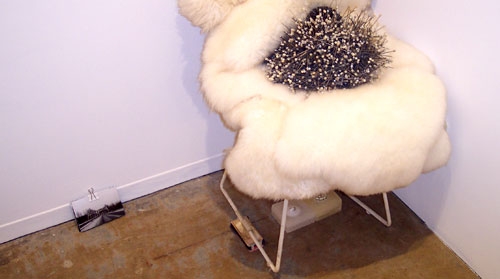Kelly Lycan
Karen Ngan
Peggy Ngan
Etienne Zack
Opening: Saturday, January 15, 8pm
Artists’ Talk: Saturday, January 29, 2pm
Curated by Sally Lee
The group exhibition “Living It” examines the everyday by looking at how what we consider as socially dysfunctional can be recycled and re-valued through the juxtaposition of display and displacement. It brings together photography, installation, drawings, and paintings by four emerging Vancouver artists – Kelly Lycan, Karen Ngan, Peggy Ngan and Etienne Zack, as well as Ryan Larkin’s 1969 Oscar-nominated animation piece, “Walking.”
Numerous approaches to the everyday and the trivial can be found in history, folklore, and popular culture. Certain acts and certain things in life are not necessarily given much weight, yet they play a role in helping us situate our fundamental relationship to other things around us and how we conduct our day-to-day activities. This exhibition is a response to living that is not only biological but also informed by “habitus” – internalized, often unconscious schemes of activity (taste, disposition, body language) that potentially allow for agency within established social structures.
By grouping collections together, a certain specific time in history can be pinpointed, allowing for us not only to see how the processes of technology have changed our lives but how the notion of convenience has been commercialized as the driving force informing our livelihoods. Indeed, the manifestation of irresponsibility is perhaps one of the most successful marketing strategies around today. In a society of abundance, commodity is defined by its efficiency and utility; the replacement of old for new and improved quality goods is the socio-economical law. The different ways in which we have been socialized and how our behaviour has been influenced by the mass media, have led us to be incapable of linking consumerism to waste.
Ryan Larkin’s “Walking” (1969) comprises of incidental but precise observations on how our bodies and body structure move while we are walking. Walking is a simple movement that does not require much thinking; Larkin starts from this to produce a dynamic piece with only two simple colors and an action. Kelly Lycan’s “The Manner In Which Seeing Takes Place” accumulates numerous sections in the shape of a mantle piece, a reference to how people tend to stack their most precious belongings on the mantle piece to the point where they, layered in such density, reach a pinnacle sense of suspense and suggest the potentiality within the transitional means of accumulation. Karen and Peggy Ngan’s performance, “What Is Right Next To Me,” explores the identity of being twin sisters and how audience members project their own expectations onto the twins upon seeing them. In his paintings, Etienne Zack’s choice of setting in his paintings often projects a chaotic, abandoned commonplace that resembles children’s playgrounds. The playfulness and whimsical characteristics dwell uncomfortably yet make sense alongside a loud, super-imposed image that references the ephemeral quality of the objects as well as memory itself.
Centre A gratefully acknowledges the generous support of its patrons, sponsors, members, partners, private foundations, and government funding agencies, including the Canada Council for the Arts, British Columbia Art Council, and the City of Vancouver through the Office of Cultural Affairs.










